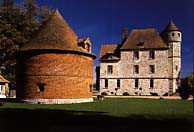The Vascoeuil Castle is the home of the only Michelet Museum in France. The historian was the victim of censorship under the Second Empire because of his liberal positions. The courses he taught at the College of France were abolished starting in 1851, that is to say, one year before the proclamation of the Empire, then, in 1853, he lost his post at the National Archives for having refused to take an oath under Napoleon III. Thus, Michelet retired from public life in order to dedicate himself to his work as an historian.
For more than twenty years, Michelet made frequent trips to to the Vascoeuil Castle which belonged to the mother of one of his College of France students, Alfred Poullain-Dumesnil. Smitten with the woman, he was received into the 15th, 16th and 17th Century dwelling in 1840. She passed away in 1842, but Michelet continued to go to Vascoeuil: his daughter from a first marriage and Alfred fell in love with each other. The union was celebrated in 1843.
It was here that Michelet conceived the plan for his gigantic Histoire de France (History of France) which appeared in its entirety in 1869. He certainly found inspiration in the contemplation of the castle's medieval murals, but the sight of nature and the warm family atmosphere equally influenced his naturalist works (La Mer/The Sea, l'Oiseau/The Bird).
The Vascoeuil Castle today displays his office, restored to its original state, at the top of the tower. A museum was inaugurated in 1989 in order to recall the stays of the historian. It displays portraits and busts of Michelet, photographs of him by Nadar, momentos of the writer and of his family, but also of their famous hosts, Béranger, Lamennais and Edgard Quinet.
Besides the Michelet Museum, the Vascoeuil Castle houses an important center of contemporary art which regularly organizes exhibitions.
Michelet Museum-Vascoeuil Castle


